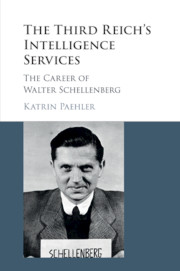Book contents
- Frontmatter
- Dedication
- Contents
- List of Figures
- Acknowledgments
- Archives
- Introduction
- 1 Gaining a Foothold
- 2 Rising Star
- 3 Intelligence Man
- 4 Office VI and Its Forerunner
- 5 Competing Visions: Office VI and the Abwehr
- 6 Doing Intelligence: Italy as an Example
- 7 Alternative Universes: Office VI and the Auswärtige Amt
- 8 Schellenberg, Himmler, and the Quest for “Peace”
- 9 Postwar
- 10 Concluding Thoughts
- Appendix
- Glossary
- Index
1 - Gaining a Foothold
Published online by Cambridge University Press: 31 March 2017
- Frontmatter
- Dedication
- Contents
- List of Figures
- Acknowledgments
- Archives
- Introduction
- 1 Gaining a Foothold
- 2 Rising Star
- 3 Intelligence Man
- 4 Office VI and Its Forerunner
- 5 Competing Visions: Office VI and the Abwehr
- 6 Doing Intelligence: Italy as an Example
- 7 Alternative Universes: Office VI and the Auswärtige Amt
- 8 Schellenberg, Himmler, and the Quest for “Peace”
- 9 Postwar
- 10 Concluding Thoughts
- Appendix
- Glossary
- Index
Summary
Friends and foes alike agreed upon his intellectual abilities and his work ethic, attributes that helped his career. Alternately described as charming and personable or as evasive and cunning, Walter Friedrich Schellenberg was barely over thirty when, after an almost meteoric ascent through the ranks of the SD, he was appointed to head the foreign intelligence section of Heinrich Himmler's Reich Security Main Office in the summer of 1941. He thus became one of the six (sometimes seven) RSHA department heads and moved in the highest circles of Nazi Germany's elites. Who was this man? Where did Schellenberg come from?
In his postwar memoir, a self-promotional and exculpatory spymaster's tale as well as in testimonies given in allied captivity, Schellenberg told a simple story that must have resonated with many of his German contemporaries. It also captured the imagination of his allied interrogators. The youngest of seven children, Schellenberg was born in Saarbrücken in 1910. His father was a piano manufacturer whose business fell on hard times in the aftermath of the Great War and the French occupation of the Saar territory. The family eventually relocated to Luxembourg; Schellenberg stated that his interest in foreign policy began then. Schellenberg's mother was a homemaker, and – postwar – he credited her with his “Christian upbringing.” His father's “liberal philosophy and outlook,” he claimed to have felt later in his youth. After graduating from the Realgymnasium, high school, Schellenberg began his studies in the summer term of 1929. He allegedly matriculated in medicine but switched to law for economic considerations, passing his first judicial state exam at the University of Bonn in early 1933. He joined the NSDAP and the SS the same spring.
Schellenberg proffered various postwar explanations for his decision to join the party and the SS: when he attempted to secure a state grant for his mandatory traineeship in law, the judge who reviewed Schellenberg's application “suggested that my chances of securing a grant would increase appreciably [emphasis added] if I were a member of the Nazi Party and one of its formations, the SA or the SS.” Schellenberg did not hesitate taking this advice.
- Type
- Chapter
- Information
- The Third Reich's Intelligence ServicesThe Career of Walter Schellenberg, pp. 23 - 45Publisher: Cambridge University PressPrint publication year: 2017

